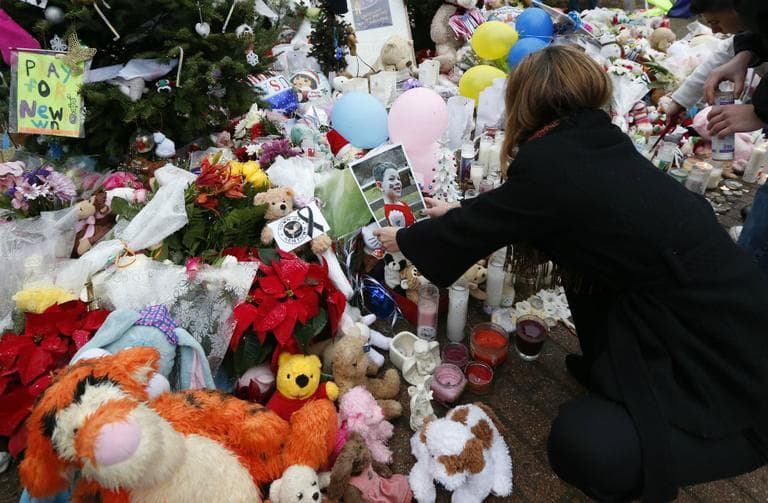Advertisement
How To Talk To Kids About Extreme Violence
Resume
How do you talk to your kids about the Newtown shootings? And how should parents talk with each other?
A roundtable of experts joins us to discuss how families and schools can cope with the trauma, pain and questions raised by acts of extreme violence.
Guests:
- Wendy Price, past president of the Massachusetts School Psychologists Association, Mass. delegate to the National Association of School Psychologists and a practicing school psychologist at a high school in the South Shore
- Deborah Rivlin, director of education and training at The Children's Room, a non-profit dedicated to supporting grieving families, and founder of The CIRCLE, a project of Boston Medical Center’s Good Grief Program
- John Palfrey, head of Phillips Academy in Andover
Letter from the head of Phillips Academy to his students
Dear Phillips Academy students:
I am thinking of you, from snowy Andover, MA, for many reasons, but primarily because of the terrible tragedy in Newtown, CT on Friday. While I hope you are enjoying a well-deserved break, I am certain that the news of the school shooting has reached you, wherever in the world you may be for the holidays.
To ignore events of this magnitude would be hard to do — and also a mistake, a step along the dangerous path toward becoming desensitized to the suffering of others. But even when one looks at what happened at Sandy Hook Elementary School head on, it is hard not to have a sense of powerlessness in the midst of the sadness. I am writing to suggest that there are positive things that we all can do. Here are three responses to consider:
Empathy: One way to channel our sadness is to feel empathy for those who are affected directly by these events. As President Obama said tonight at the prayer vigil for the victims and their families: "Whatever portion of sadness that we can share with you, to ease this heavy load, we will gladly bear. Newtown, you are not alone." The President is right: communities, even the global community, can stand together in ways that make everyone stronger, including those bearing the heaviest burdens in the wake of the tragedy. Some people are flying flags at half mast; others are holding prayer vigils; I noticed that Andover students have been writing messages online with the hashtag #prayersfornewtown. It almost doesn't matter how we express our support, but feelings of empathy and responses, however small, can make an extraordinary difference. We can work together to instill a sense of hope and of community on the saddest of days. It is on these saddest of days when this connectedness is most important.
Compassion: A step beyond empathy, we can each find within ourselves compassion toward others and act upon that compassion. Andover's founding principle of non sibi demands that of us all, on every day. Our admissions office, in choosing all of you, has selected not just for your talents and brilliance, but the fact that each of you is nice, and therefore good at compassion. These are ideals that define our community, compelling us to act while on campus and during lifelong associations with this academy. In the midst of the holidays, and also the complex time for our seniors of finishing college applications and hearing some early news, we can all find new ways to act with compassion toward one another, at home and in our communities. Tragedies can be an effective way to summon the better angels of our nature.
Engagement: Trickiest of the three is to engage with the news and speak out about it. This can be especially hard when the facts strike close to home: the violence took place in a school in a small New England town, which could have been virtually any school, anywhere in the world. The random quality of this attack makes the violence seem all the more unspeakable; and yet we should speak about it, and seek to understand how we can prevent it from happening the next time. There are many debates buried here in these facts. The historic debate in the United States about the 2nd Amendment, the right to bear arms, and the movement for gun control is one. The paucity of care for those with mental health disorders in our society is another. Those on the Phillipian or in Philo have natural outlets for engagement with these issues, but we can all find ways to be involved in civic life around related issues. Whether through social media, at the dinner table, or in our communities, we can all be part of learning from these terrible events and helping to improve our societies in their aftermath.
My own reaction to these events has been sadness mixed with an aspiration to do all these things. But most of all I am overwhelmed by a sense of gratitude for the strong and supportive community I find myself and my family in, here at Andover. I wish you a restful and happy time with your family.
Warmly,
JP
This segment aired on December 17, 2012.